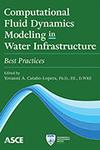Chapter 1
Introduction
Publication: Computational Fluid Dynamics Modeling in Water Infrastructure: Best Practices
Abstract
Computational fluid dynamics (CFD) is a branch of fluid mechanics that uses numerical analysis and data structures to calculate, analyze, and visualize fluid (liquids, gases, and dissolved gases) flows. This chapter provides general introductions to best practices for CFD modeling in water infrastructure for practitioners, particularly those new to CFD modeling, which is becoming a widely used tool in the design and retrofitting of water, wastewater, and stormwater infrastructure. The method serves as an alternative or complement to physical modeling. The full CFD modeling process is divided into four major groups: problem formulation, preprocessing, model simulations, and postprocessing. The chapter also presents some of the key concepts discussed in this book. The book covers problem formulation and selection of multiphysics models. It describes the steps in choosing the most adequate numerical model and turbulence schemes. The book presents meshing techniques and types and discusses initial and boundary conditions.
Get full access to this article
View all available purchase options and get full access to this chapter.
References
ASCE. 2018. Standard guidelines for in-process oxygen transfer testing. ASCE/EWRI 18-18. Reston, VA: ASCE.
ASCE. 2022. Measurement of oxygen transfer in clean water. ASCE/EWRI 2-22. Reston, VA: ASCE.
ASME (American Society of Mechanical Engineers). 2009. Standard for verification and validation in computational fluid dynamics and heat transfer. New York: ASME.
Colorado Department of Public Health and Environment. 2021. Technical guidance manual on computational fluid dynamics modeling of chlorine contact Basins—Determining baffling factors through the use of CFD modeling. Glendale, CO: Colorado Department of Public Health and Environment.
ERCOFTAC (European Research Community on Flow, Turbulence, and Combustion). 2000. Industrial computational fluid dynamics of single-phase flows. Paris: ERCOFTAC.
ERCOFTAC. 2008. Computational fluid dynamics of dispersed multi-phase flows. Version 1. Paris: ERCOFTAC.
Fayolle, Y. 2006a. “Modeling of hydrodynamics and oxygen transfer in aeration channels, modeling of hydrodynamics and oxygen transfer in oxidation ditches.” [In French.] Ph.D. thesis, INSA de Toulouse and Cemagref, Institut National des Sciences appliquées de Toulouse, Section VI.2.1.
Fayolle, Y., S. Gillot, A. Cockx, M. Roustan, et al. 2006b. “In situ local parameter measurements for CFD modeling to optimize aeration.” In Proc., WEFTEC 06. Alexandria, VA: Water Environment Foundation.
Garofalo, G., and J. Sansalone. 2019. “Modeling annual particulate matter separation and washout by unit operations with CFD.” J. Environ. Eng. 146 (1): 04019101.
Karpinska, A. M., and J. Bridgeman. 2016. “Review—CFD-aided modelling of activated sludge systems: A critical review.” Water Res. 88: 861–879. https://doi.org/10.1016/j.watres.2015.11.008.
Karpinska, A. M., and J. Bridgeman. 2017. “Towards a robust CFD model for aeration tanks for sewage treatment—A lab-scale study.” Eng. Appl. Comput. Fluid Mech. 11 (1): 371–395.
Liu, X., and J. Zhang, eds. 2019. “CFD applications in water, wastewater, and stormwater.” In Computational fluid dynamics: Applications in water, wastewater, and stormwater treatment. Reston, VA: ASCE.
Liu, X., J. Zhang, K. D. Nielsen, and Y. A. Cataño-Lopero. 2020. “Challenges and opportunities of computational fluid dynamics in water, wastewater, and stormwater treatment.” J. Environ. Eng. 146 (11): 02520002.
NRC (US National Regulatory Commission). 2013. Validation of a computational fluid dynamics method using horizontal dry cask simulator data. NUREG/CR-7274. Washington, DC: NRC, Office of Nuclear Regulatory Research.
Samstag, R. W., J. J. Ducoste, A. Griborio, I. Nopens, et al. 2016. “CFD for wastewater treatment: An overview.” Water Sci. Technol. 74 (3): 549–563.
Uby, L. 2019. “Next steps in clean water oxygen transfer testing—A critical review of current standards.” Water Res. 157 (June): 415–434. https://doi.org/10.1016/j.watres.2019.03.063.
Xi, L., D. W. Yin, and J. S. Park, eds. 2021. CFD modeling of complex processes—Multiscale and multiphysics challenges. Basel, Switzerland: MDPI Books.
Information & Authors
Information
Published In
Computational Fluid Dynamics Modeling in Water Infrastructure: Best Practices
Pages: 1 - 4
Editor: Yovanni A. Cataño-Lopera, Ph.D., P.E., D.WRE
ISBN (Online): 978-0-7844-8512-5
Copyright
© 2023 American Society of Civil Engineers.
History
Published online: Oct 3, 2023
ASCE Technical Topics:
- Business management
- Chemical properties
- Chemistry
- Computational fluid dynamics technique
- Data analysis
- Decision making
- Decision support systems
- Dissolved gases
- Engineering fundamentals
- Environmental engineering
- Flow (fluid dynamics)
- Fluid dynamics
- Fluid flow
- Fluid mechanics
- Gases
- Hydrologic engineering
- Infrastructure
- Methodology (by type)
- Models (by type)
- Physical models
- Practice and Profession
- Research methods (by type)
- Water and water resources
Authors
Metrics & Citations
Metrics
Citations
Download citation
If you have the appropriate software installed, you can download article citation data to the citation manager of your choice. Simply select your manager software from the list below and click Download.
